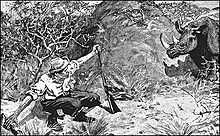Ewart Grogan
| Ewart Scott Grogan | |
|---|---|
 | |
| Born | December 12, 1874 |
| Died |
August 16, 1967 (aged 92) Cape Town, South Africa |
| Occupation | Explorer |
| Known for | First person to walk the length of Africa |
| Signature |
 |
Ewart Scott Grogan (1874–1967) was a British explorer, politician, and entrepreneur. He was the first person to walk the length of Africa, following a path from Cape Town to Cairo.[1][2]
Biography

Ewart Grogan was educated at Winchester College and Jesus College, Cambridge, which he left without taking a degree.[3] He was expelled from both school and university.[4] He subsequently spent some time at the Slade School of Art before going to Bulawayo to help defend the town in the Second Matabele War.[citation needed]
He fell in love with Gertrude Watt, the sister of a Cambridge classmate, but her stepfather disapproved of the match; while Grogan came from a respectable family, his own life had little to recommend it. He proposed becoming the first man to make the Cape-to-Cairo journey; the stepfather agreed that this would be a suitable test of his character and seriousness.[4]
He then commenced his expedition from Cape Town to Cairo at the age of 24, reaching Cairo in 1900, after two and a half years of travelling. He had been stalked by lions, hippos, and crocodiles, pursued by headhunters and cannibals, plagued by parasites and fevers. He returned home a popular sensation. He was made a fellow of the Royal Geographic Society and met Queen Victoria. In four months of effort, Grogan wrote about his journey in From the Cape to Cairo; the first traverse of Africa from south to north (1902). Capping his success, he married Gertrude.[4]
Gertrude's Garden Children's Hospital located in Nairobi, Kenya was founded in 1947, with the donation of some land by Colonel Ewart Grogan, in memory of his wife, Gertrude Edith. The hospital now has seven branches spread out in the City's residential areas.
While at Cambridge Grogan was a member of the notorious and mysterious dining society, The Natives. The club, which has run for over 135 years, toasts Grogan's journey from Cape Town to Cairo at every dinner.
First World War
In October 1914 Grogan traversed part of German East Africa to Kivu where he met his old friend the Belgian Josué Henry.[5] Most of his subsequent life was spent in east Africa, mainly Kenya, where he settled. He died in South Africa at the age of 92.[4]
Kenya
Grogan held strong views regarding Black Africans: "A good sound system of compulsory labour would do more to raise the nigger in five years than all the millions that have been sunk in missionary efforts for the last fifty."[6] He earned the distinction, in 1908, of becoming the first Kenyan settler to commit a "killing which aroused the indignation of all fair minded people in Kenya and abroad", when he, along with four friends, flogged two of his so-called rickshaw boys so viciously for so long that one died, while the other was hospitalised for three months. Grogan was initially charged with murder, but ended up being convicted of mere common assault, serving just two months' hard labour as punishment.[7]
Legacy
In 2007, American journalist Julian Smith retraced Grogan's route from South Africa to southern Sudan, and wrote about it in the book Crossing the Heart of Africa (2010).[8] The book also re-tells Grogan's journey and life story.[4]
References
- ↑ Spurling, John (2001-05-04). "Kenya's Churchill". London: The Times. Retrieved 2008-11-23.
- ↑ "Grogs & the Yappers". TIME. 1956-08-13. Retrieved 2008-11-23.
- ↑ "Grogan, Ewart Scott (GRGN893ES)". A Cambridge Alumni Database. University of Cambridge.
- ↑ 4.0 4.1 4.2 4.3 4.4 Ken Ringle, "Risking Life and Limb for Love", The Washington Post, 9 Jan. 2011, p. B6.
- ↑ PAICE (2007)
- ↑ Grogan & Sharp 1900, p. 360.
- ↑ Bailey 1993, p. 21
Astonishingly, a 1981 biography by Leda Farrant is unabashedly called The Legendary Grogan, and as recently as 2001 HarperPress felt able to publish one by Edward Paice entitled Lost Lion of Empire. - ↑ Julian Smith. Crossing the Heart of Africa: An Odyssey of Love and Adventure, Harper Perennial, 2010, ISBN 978-0-06-187347-8
Bibliography
- Bailey, Jim, ed. (1993). Kenya, the National Epic: From the Pages of Drum Magazine. Nairobi: Kenway Publishers.
- Grogan, Eward; Sharp, Arthur H. (1900). From the Cape to Cairo: the first traverse of Africa from south to north. London: Hurst and Blackett.
- Paice, Edward (2007). Tip & Run: The Untold Tragedy of the Great War in Africa. London: Phoenix. ISBN 978-0-7538-2349-1
- Paice, Edward (2002). Lost Lion of Empire: The Life of 'Cape-to-Cairo' Grogan. HarperCollins UK. ISBN 978-0-00-653073-2
External links
- Works by and about Ewart Scott Grogan at Internet Archive (scanned books original editions)
- "African Traveler Here: Ewart W. Grogan Tells of His Journeys from South to North" (PDF). The New York Times. 1900-11-18. Retrieved 2009-01-11.
- Roberts, Chalmers. (January 1901). "A Wonderful Feat of Adventure". The World's Work. Retrieved 2009-01-11.
- People of Africa's Past: Ewart Grogan (11). Travel Africa Magazine. Spring 2000. Retrieved 2009-01-11.
- Ewart Grogan at Find a Grave
|